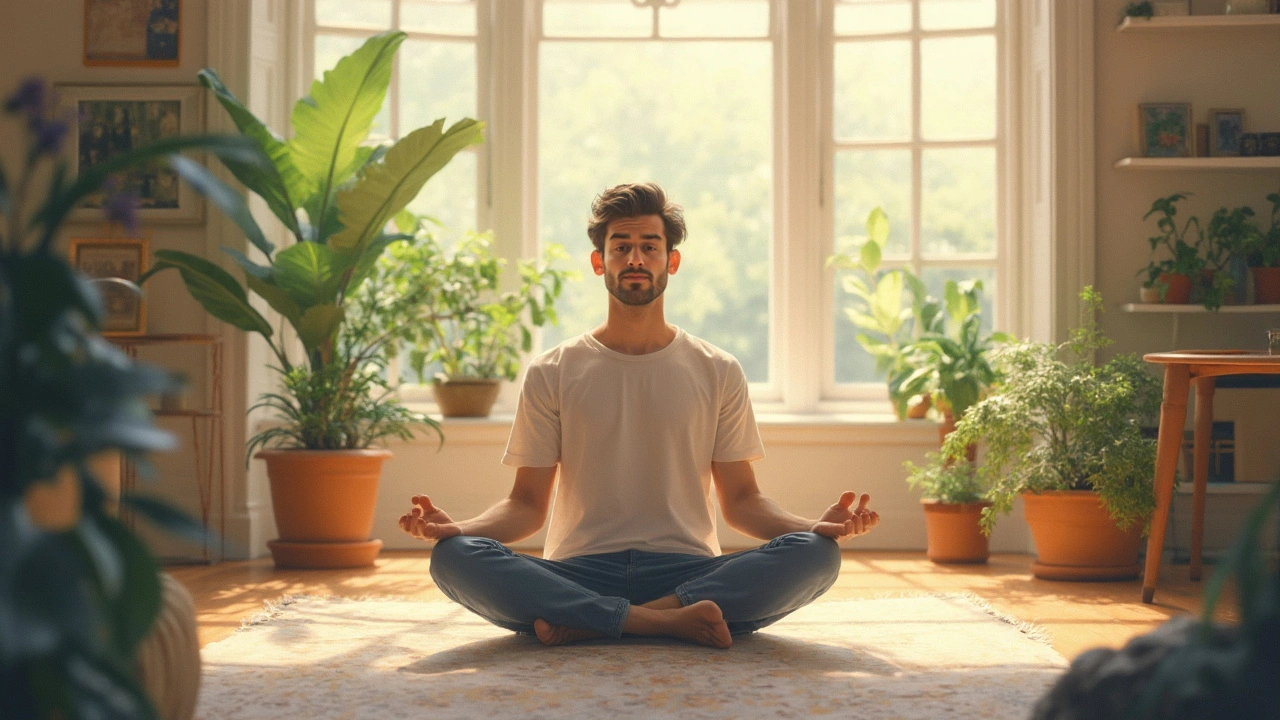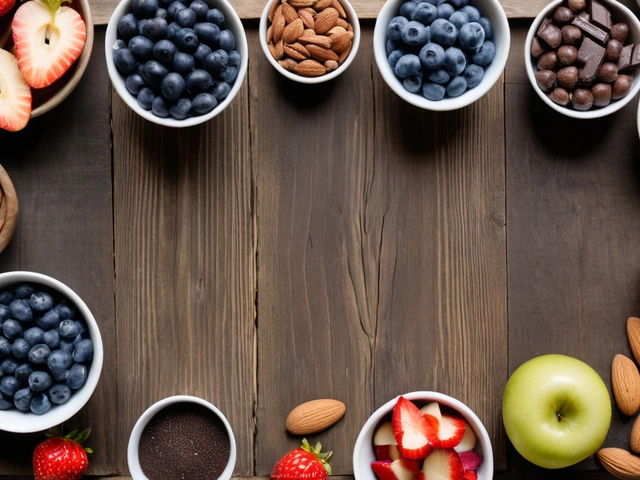Ever thought about how setting health goals could totally transform your life? It's not just about wanting to fit into your high school jeans again—although that's cool too! Health goals are about creating a lifestyle that makes you feel awesome inside and out. They can improve your mood, energy, and even your relationships because you simply feel better.
One of the biggest goals to shoot for is making physical activity a regular thing. Don't worry, you don't have to train like an Olympian. Even a daily walk or a quick session of yoga can do wonders for your body and mind. It's all about finding an activity you enjoy, so it doesn't feel like a chore.
- Prioritize Physical Activity
- Adopt a Balanced Diet
- Focus on Mental Health
- Cultivate Healthy Sleep Habits
- Stay Hydrated
Prioritize Physical Activity
Why is getting off the couch such a big deal? It's simple: moving your body is like hitting the refresh button for your whole system. Regular physical activity isn't just a key health goal—it's a total game-changer for your overall well-being.
Okay, so let’s break it down. The CDC says adults need at least 150 minutes of moderate aerobic exercise a week. Sounds like a lot? It's really just 30 minutes a day, five days a week. And before you say, “I can’t fit that in!” remember that it doesn't have to mean hitting the gym. Think brisk walking, dancing in your living room, or even gardening. It's about moving more, not obsessing over the perfect workout.
But what's in it for you? Tons! Exercise can help you lose weight, feel better, and lower your risk of diseases like Type 2 diabetes and heart problems. Plus, you'll probably sleep better and might even notice a boost in your mood thanks to those endorphins.
- Start small: Add a 10-minute walk during your lunch break.
- Set realistic goals: Maybe aim for a half-marathon, but first, commit to running a mile without stopping.
- Track your progress: Use a simple app or a journal. Seeing improvements can keep you motivated.
- Find a buddy: Everything's more fun with a friend, including workouts!
And if you're someone who likes stats, here's a little incentive: consistent exercise can reduce the risk of chronic diseases by up to 30%. That's a pretty good reason to swap some screen time for sweat time. Remember, the goal is to feel good and be active, not perfect. Make physical activity part of your routine, and you'll definitely thank yourself later.
Adopt a Balanced Diet
Eating right isn't just about munching on salads all day long. Adopting a balanced diet is like creating a playlist that has a bit of everything you need to groove through your day feeling your best. It’s about getting the right mix of nutrients from different food groups to keep your body in top shape.
First things first, don’t skip your veggies and fruits—they’re packed with vitamins and minerals that are great for your body. Aim to fill half your plate with these colorful powerhouses at every meal. Think of them as nature's candy! They're low in calories but high in fiber, keeping you full and happy without weighing you down.
Protein is your buddy too! It's vital for building muscles, making hormones, and keeping your immune system strong. You can include lean meats, fish, beans, and eggs in your meals. Feeling adventurous? Try plant-based proteins like quinoa or tofu. They’re trendy and tasty!
- Whole grains like brown rice, oats, and whole wheat bread are also winners, giving you energy and keeping your digestion on track.
- Healthy fats from nuts, seeds, and avocados should make it to your list, as they support your heart and brain.
And here's the golden rule: moderation is key. Yes, you can enjoy a slice of pizza or a scoop of ice cream. Just keep it in check and savor every bite. Your goal is to create balance, not feed restrictions.
Did you know, according to recent data, people who consume a balanced meal have a 10% less chance of developing heart conditions before they hit 50? It’s wild how much of a difference it can make just by mixing it all up.
So, the next time you're planning your grocery list or picking from a menu, keep these tips in mind. Your body will thank you, and you'll have more energy to do the things you love. Who wouldn’t want that?

Focus on Mental Health
Mental health is just as important as physical health, maybe even more so. We all know life can get stressful, right? Whether it's work, relationships, or just the daily grind, it can take a toll on your mind. So, what can we do to stay mentally fit?
First up, recognize that it's okay to not be okay sometimes. Acknowledging your feelings is the first step in dealing with them. Try practicing mindfulness or meditation. Even just a few minutes a day can help reduce stress and increase clarity.
Another biggie is staying connected with friends and family. Sometimes, just talking it out with someone you trust can be a huge relief. It helps to know you're not alone in what you're going through.
Don’t forget about exercise. We often think of it as just a physical thing, but it’s a game-changer for mental health too. Physical activity releases endorphins, those feel-good hormones that boost your mood.
Let's put nutrition into the mix. A balanced diet isn't just good for the body; it's food for the brain too. Omega-3 fatty acids, found in fish like salmon, and leafy greens are known to support mental health.
If you're feeling swamped, consider speaking to a professional. Therapy can be a powerful tool to help navigate the complexities of life and is totally normal and okay to seek help.
Remember, mental well-being is a part of the holistic approach to our health goals that we all need to prioritize. Take small steps, be kind to yourself, and keep mental health on your radar.
Cultivate Healthy Sleep Habits
Did you know that getting enough sleep is like hitting the refresh button on your body and mind? We all know sleep is important, but how often do we actually make it a priority? Many folks struggle with sleep, and the effects are no joke—lack of sleep messes with everything from your mood to your immune system.
First things first, aim for a solid 7-9 hours each night. How do you get there? Start by creating a cozy, sleep-friendly environment. Keep your bedroom dark, cool, and quiet. And say goodbye to screens at least an hour before bed. The blue light from phones and tablets can mess with your body's sleep signals.
Sticking to a regular sleep schedule also helps heaps. Try to go to bed and wake up around the same time every day, even on weekends. Think of it as keeping your body's internal clock steady.
Here's a cool tip: establish a bedtime ritual. Maybe that's reading a book, taking a warm bath, or doing some light stretches. It doesn’t have to be fancy, just something that signals to your body that it’s time to wind down.
Finally, watch what you eat and drink before bed. Heavy meals, caffeine, and alcohol can all interfere with falling asleep and staying asleep. Keep it light and avoid caffeine in the afternoon and evening.
Remember, good sleep isn’t a luxury; it’s a must for your overall well-being. So go ahead and make your bedtime routine as important as any other health goals you set.

Stay Hydrated
Drinking enough water seems like a no-brainer, but you'd be surprised at how many people struggle with it. Staying hydrated is one of the simplest yet most effective health goals you can set. Your body is made up of more than 60% water, so it's kind of a big deal!
So, why is water such a superstar for your body? For starters, it can boost your energy levels, which helps you tackle your day without feeling like you're dragging your feet. It also helps with digestion, keeps your skin looking good, and even aids in maintaining a healthy weight. Water can be your body's little helper in so many ways.
Wondering how much is enough? A good rule of thumb is to aim for around eight 8-ounce glasses a day, also known as the “8x8” rule. But remember, everyone's needs are different. Factors like exercise, climate, and overall health can mean you need even more.
If plain water isn't your thing, mix it up a bit. Try infusing your water with fruits like lemons, limes, or berries. Herbal teas are another tasty way to boost your intake. And here's a fun tip: grab a water bottle you love. You'll be more likely to drink if it's easy to carry and fill.
Check out this handy guide on how staying hydrated can benefit you:
| Benefit | How It Helps |
|---|---|
| Boosts Energy | Improves mood and cognitive function |
| Flushes Toxins | Keeps your system running smoothly |
| Maintains Skin Health | Hydrates and keeps skin looking fresh |
| Regulates Body Temperature | Prevents overheating during workouts |
So, grab a glass, fill it up, and toast to good health with a simple, refreshing sip of water. Your body will thank you!






